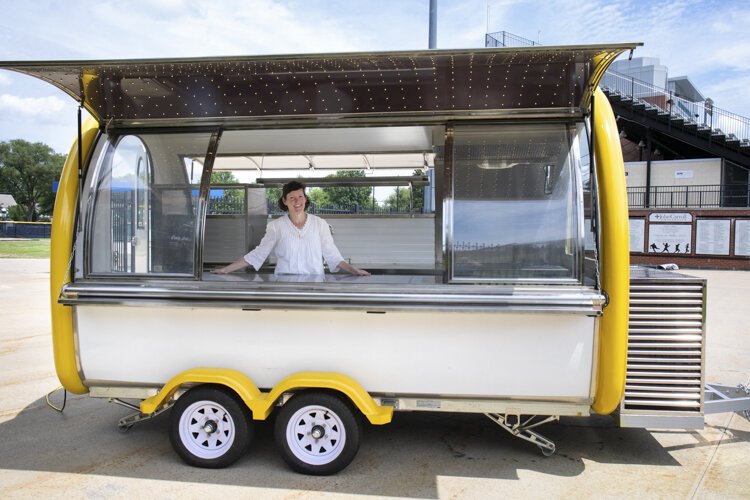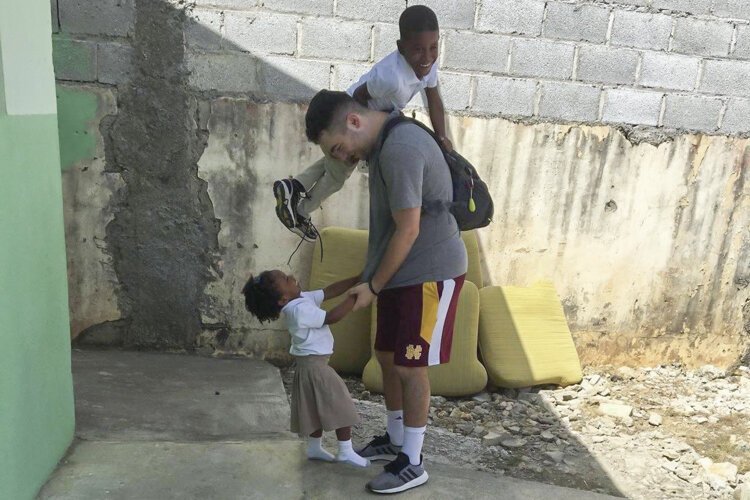Food for Thought: JCU student entrepreneurs create food buggy to feed the homeless
As a Jesuit Catholic institution, John Carroll University (JCU) in University Heights has always placed an emphasis on community service and leadership. And at its Edward M Muldoon Center for Entrepreneurship in the Boler School of Business, JCU students combine that community service mission with developing their minds—and business ideas—for successful entrepreneurial careers.
Most recently, the students minoring in entrepreneurship were given a challenge: Develop a business idea around a food buggy that could raise money through food sales while also helping feed Cleveland’s homeless population.
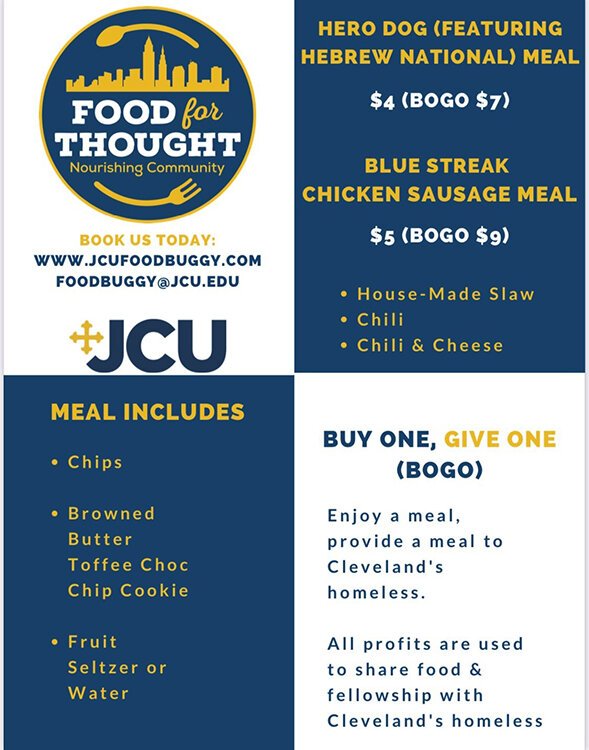 “This course is really looking at civic engagement and entrepreneurship,” says Katherine Feely, director of JCU’s Center for Service and Social Action. “Students get really involved in the community. It’s service-based learning.”
“This course is really looking at civic engagement and entrepreneurship,” says Katherine Feely, director of JCU’s Center for Service and Social Action. “Students get really involved in the community. It’s service-based learning.”
Over the course of the past year, students in JCU’s entrepreneurial class have developed and are now implementing a complete food buggy business with a social service spin of feeding the homeless.
In the fall 2020 semester, entrepreneurship minors taking a social entrepreneurship class were challenged with coming up with a concept for a food buggy that meets a social need. Five groups of four students created business plans and pitched and implemented those plans that would make money and help people experiencing homelessness.
Students will operate the buggy during the day to turn a profit, and then use the profits to feed people experiencing homelessness at night and on the weekends.
“The whole point of this is for students to use it for a high-impact real-world learning experience,” says Feely. “Part of the unique model at JCU is to take experiential learning to the next level. All majors are welcome to take the entrepreneurship class, so this course pulls from all majors and minors.”
This semester, the students taking the class are implementing a pilot program—opening the food buggy in front of the JCU administration building on Administration Drive this Thursday, April 15.
That experiential model means students get out into the real world to test their concepts and ideas, Feely says. “They use that real world experience to come back to the classroom and [decide] what do you do now, what do you do next—take a deeper dive into a course.”
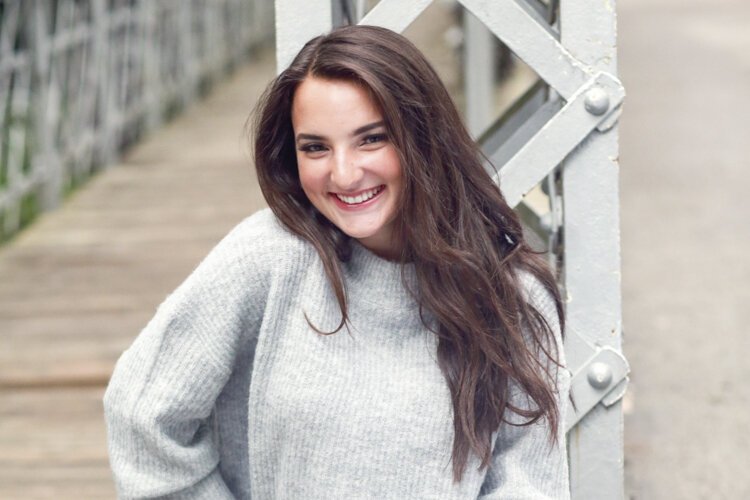 Constance EconomusLast fall, sophomore integrated marketing communication major Constance Economus, and Max Loeb, a sophomore double majoring in marketing and supply chain management, took their classroom learning to the streets with their food buggy concepts.
Constance EconomusLast fall, sophomore integrated marketing communication major Constance Economus, and Max Loeb, a sophomore double majoring in marketing and supply chain management, took their classroom learning to the streets with their food buggy concepts.
“It was definitely a really fun class,” says Loeb. "I enjoyed it a lot.”
Economus’ team’s idea was for a business called Berry Generous—creating smoothie bowls and selling them to hospital staff, professionals, and shoppers at shopping centers and area hospitals.
“We’d run the food buggy during the day and go to places like Eton [Collection], Pinecrest, or even the Cleveland Clinic,” Economus explains. “Professionals would buy our products and with that profit we would use it to buy meals and feed the homeless at night.”
Loeb says his team thought about serving breakfast and lunch items, but ultimately the team went with a customized breakfast bowl concept. “From the studies we did, breakfast was by far the most popular food,” he says. “Everyone loves breakfast.”
Because the goal of the buggy is to raise money to feed the homeless population, Loeb says they thought about places where they could do the most business and raise more money. So, they chose First Energy stadium during Browns games.

“We decided on the stadium, with the Browns games on the weekends, so we could continue to make money and sell food,” Loeb explains. “We understood the main purpose of this was to serve good food during the day and be able to serve food to the homeless at night."
Before the pandemic, Loeb volunteered with his church at the Boston Engagement Center, an outreach center focused on the homeless—putting together donations and playing board games.
“I'd always try to remember their names, and I’d introduce myself,” Loeb says of the experience, adding he’s envisioned taking the same approach with the food buggy. “We want to form relationships with people.”
Like Loeb, Economus says they estimated their smoothie bowl concept would cost about $3 a bowl to make and they would sell it for $10. “That $7 profit goes toward making meals for the homeless,” she explains. “We did our research and the average price of a meal to feed someone in need was around $3.”
The class this semester was then charged with assessing the previous class’s proposals and deciding on which concept worked for fulfilling the needs of both paying customers and the hungry.
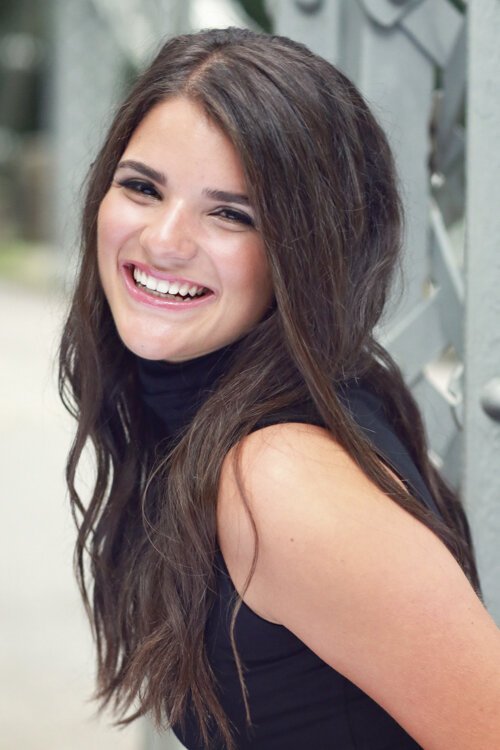 Lily EconomusLily Economus, Constance’s sister and a marketing communication major, is taking the class this semester. This term the students have been charged with figuring out the operation logistics, purchasing, and financials of running the food buggy. “It’s exciting to be a part of this experience,” she says, adding they are excited to test the concept.
Lily EconomusLily Economus, Constance’s sister and a marketing communication major, is taking the class this semester. This term the students have been charged with figuring out the operation logistics, purchasing, and financials of running the food buggy. “It’s exciting to be a part of this experience,” she says, adding they are excited to test the concept.
“It’s our first event, so we want to get our feet wet and get a true experience staring a business on our own,” Lily Economus continues. It will be very cool to see what we can do with this—to make a special event that helps with a social mission in the end.”
The current class decided to focus on a simple menu for the pilot launch—selling meals consisting of Hero Dogs and Blue Streak chicken sausages (with chili or coleslaw as optional toppings) and sides. The meals will sell for $4 for a Hero Dog meal (or you can Buy One, Give One (BOGO) to the homeless for $7), or $5 for Blue Streak meal (or $9 for BOGO). The meals come with chips, brown butter toffee chocolate chip cookies, and either fruit seltzer or regular water.
The JCU entrepreneurs partnered with Lutheran Metropolitan Ministry (LMM) to acquire the food items. Lily Economus says money made with the buggy sales will go back to LMM to pay for the food, while any profits will be saved to feed the homeless in next semester’s class.
Sophia DiCillo, a junior double majoring in supply chain management and marketing, says she always considered herself an entrepreneur. “I’ve never seen the start and development of a new business,” she says. “To actually see a project through from beginning to end, and to see how it pans out, is really cool—because it’s something I want to do in the future.”
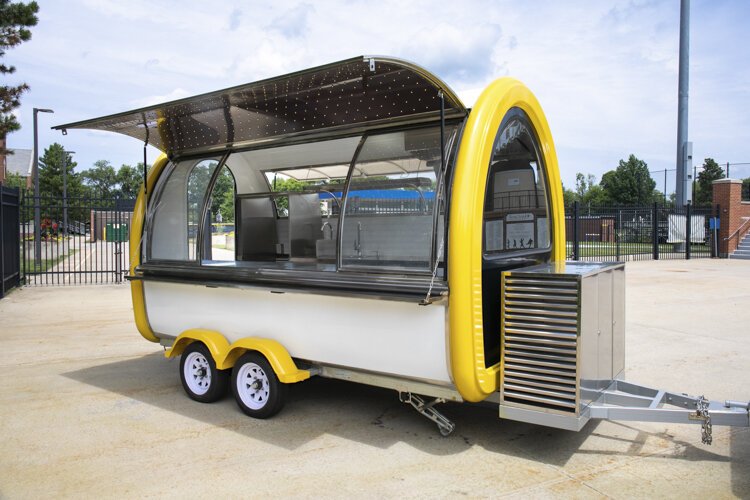 The Food For Thought food buggyMichael Moran, a junior marketing major, says he plans to go into marketing after college, but predicts he will eventually become an entrepreneur. “My parents said, ‘who knows where the future will take you,’” Moran recalls. “You never know where you will end up, so I’ll have to see what the future holds for me.”
The Food For Thought food buggyMichael Moran, a junior marketing major, says he plans to go into marketing after college, but predicts he will eventually become an entrepreneur. “My parents said, ‘who knows where the future will take you,’” Moran recalls. “You never know where you will end up, so I’ll have to see what the future holds for me.”
And Brett Clarke, an accounting major, signed up for the class for the service experience. “I’ve always been involved in service work," he says. "It allows me to go out in the community and give back in any way possible. I’m excited this course allows us to solve a social problem in the community.”
Lily Economus says she’s been searching for her dream job, and she says she thinks she’s found her calling. “Something has always been in the back of my head that, ‘wow, I could start my own business one day,’” she says. “To be a part of this hands-on experience, be a part of a social mission is unique.”
The buggy will be running on Thursday, April 15 from 11 a.m. to 1:30 p.m. on the JCU campus, on Administration Drive. Individuals can request the JCU food buggy for special events. Follow the buggy on Instagram as well.


